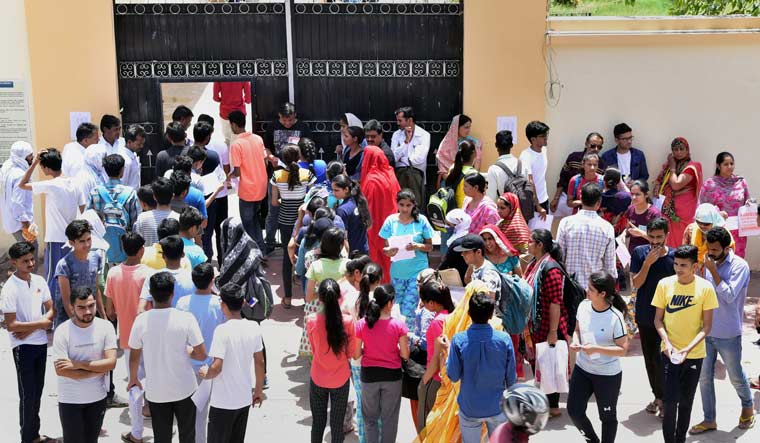Tamil Nadu Legislative Assembly on Monday passed a Bill to enact a law for scrapping the National Eligibility cum Entrance Test (NEET) exams. Seeking to dispense with the requirement of the qualifying exam for admission into undergraduate medical degree courses in the Tamil Nadu, the bill asked to provide for admission to medical courses based on Class 12 marks to ensure social justice.
The bill was moved by Chief Minister M.K. Stalin in the assembly. Stalin said that the bill was tabled based on the recommendations of the A.K. Rajan committee and that the notion that the NEET will improve the standard of medical education was wrong. “We cannot judge students based on competitive exams alone,” Stalin said, adding that the NEET has shattered the hopes of students from Tamil Nadu, particularly those from socially and economically backward sections.
“Justice Rajan committee concluded that NEET places students from economically weaker sections at a disadvantageous position,” Stalin said.
The bill
The Tamil Nadu Admission to Undergraduate Medical Degree Courses Act 2021 has been drafted based on the recommendations of the A.K. Rajan committee, constituted by the DMK government to study the impact of NEET, in June 2021.
The bill contended that admissions to medical education courses “are traceable to entry 25 of List III, Schedule VII of the Constitution of India”. It said that the state “is competent to regulate the same for underprivileged social groups”. The bill also said that the “government after careful consideration of the recommendation of the high-level committee has decided to enact a law to dispense with the requirement of NEET for admission to undergraduate medical degree courses and to provide admission to the courses based on the marks obtained in the qualifying examination through normalisation methods.”
The bill also said that it aimed to ensure social justice, uphold equality and equal opportunity and protect all vulnerable student communities from being discriminated. The bill also said that it is aimed to bring the students to the mainstream of medical and dental education and in turn ensure robust public healthcare across Tamil Nadu, particularly the rural areas.
The bill was supported by all the opposition parties including the AIADMK. Though the AIADMK earlier walked out of the assembly condemning the DMK and protesting against the suicide of a student in Salem, it voted in favour of the bill. The BJP opposed the bill and walked out in protest.
But the larger question now is if the bill passed by the assembly will get presidential assent, unlike earlier.
What next?
Just the passing of the bill doesn’t enable the students to get exempted from writing the NEET examinations. While the entrance exams for the current academic year were held on Sunday, there is no assurance that the exams for the next academic year will be scrapped.
“If the president approves the bill we can get exemption from NEET. It is still achievable by making an amendment in the NMC Act, by giving exclusion to the state which is not willing to utilise NEET marks for the medical admission for state government controlled seats,” says Dr Shanthi Ravindranath, secretary, Doctors for Social Equality. She says that the new bill passed by the TN Assembly has taken support from the recommendations from the A.K. Rajan committee which was not there in the earlier bill passed by the then AIADMK government. But given the present system, an amendment by the ruling BJP in the Centre may not be possible.
If the president doesn’t approve the bill, like earlier, the only option is to go to the court, which again may not yield results as the Supreme Court is already seized off the matter.
Will the bill stand legally?
Incidentally, education is in the concurrent list and as far as matters relating to determination of standards for higher education is concerned, the central government has the powers to amend a clause or repeal an Act. As per entry 25 of List III, the state governments cannot pass a law, as it is the exclusive domain of the Parliament. Entry 25 of list III says that “education, including technical education, medical education and universities, subject to the provisions of entries 63, 64, 65 and 66 of List I; vocational and technical training of labour” are under concurrent list.
Is NEET exemption the only solution for medical aspirants in medical education?
However, just getting exemption from NEET exams may not be the solution for keeping up the doctor dreams of the students from rural Tamil Nadu. Even if the state gets exemption from NEET, the issue of getting medical admission for students from rural areas and Tamil medium government aided school, remote and hill areas and the first generation students needs to be addressed. The constraints faced by these students cannot be addressed without reservation.
“For admitting students under the all India quota seats by the central government like JIPMER, deemed university, NEET exams can’t be exempted. There are over 50,000 medical seats in the central government quota across the country. Competitive exams are inevitable, in the present socio-economic conditions. The government has to help the students, by setting up training centres for these competitive exams, which will be helpful not just for education but also for getting employment,” says Dr G Ravindranath, Doctors for Social Equality. The government and like-minded people will have to look into options to resolve the problems faced by the students in terms of capitation fees, which is running into several lakhs in several medical colleges and deemed universities.
However, with very limited legal options available, the DMK’s anti-NEET bill hangs in balance. It is to be seen if the bill gets the Presidential assent or the DMK takes it forward legally taking support from other like-minded states which is opposing NEET.





